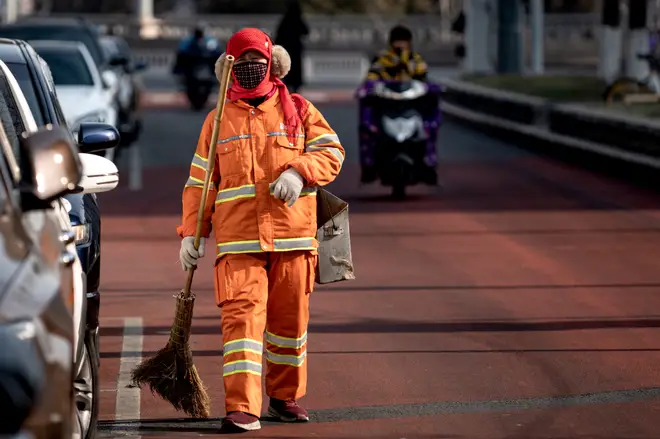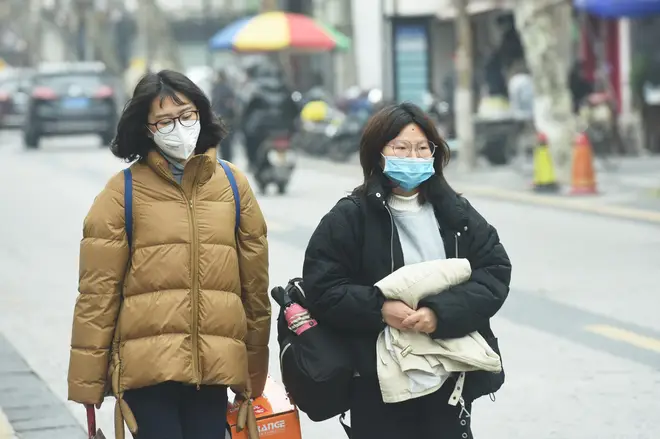
Tonight with Andrew Marr 6pm - 7pm
22 January 2020, 10:53

A new form of a potentially deadly virus has emerged in parts of Asia, and authorities are racing against time to nip it in the bud.
Flights inbound to Britain from China are to be tracked amid warning Coronavirus could spread.
People arriving into London Heathrow from Wuhan, Hubei province, will be sent to a separate area in the terminal. The checks were introduced after the US recorded its first case of the virus.
The risk to the UK population has been upgraded from very low to low by Public Health England.
But what exactly is the virus, and why are authorities taking its threat so seriously?
Coronaviruses are a collection of different contagious viruses that can in some cases cause pneumonia.
It is known to take six different forms, with symptoms including a runny nose, a cough, fever or a sore throat. The latest scare has been prompted by a new seventh possible strand.

According to the Centres for Disease Control and Prevention (CDC), it takes its name from the spikes on its surface that look like crowns, which are “coronas” in Latin.
An outbreak of the virus began in Wuhan in December 2019.
Since there have been 440 confirmed cases and nine deaths and authorities admit they are at the “most critical stage” of attempts to stem it.
It has spread to other Chinese cities and one case has been reported in the US, however none have yet been documented in Britain.
On Tuesday officials confirmed that the virus had been contracted between humans for the first time.
Gao Fu, of the Chinese Academy of Sciences and head of the Chinese Centre for Disease Control, said officials are working on the assumption that the outbreak resulted from human exposure to wild animals being sold illegally at a food market in Wuhan and that the virus is mutating.
Jiao Yahui, a health commission official, said: "The disease will continue to develop. It has developed different features compared with the early stage, and the prevention and precautionary measures need to change accordingly."
Three flights arrive into Heathrow from the city each week currently, prompting health teams to be deployed to the airport.
When people contract coronavirus, they will likely experience symptoms similar to a common cold.
However, for those with a weakened immune system the virus can develop into a more serious lower respiratory tract illness such as pneumonia or bronchitis.

The virus can cause breathing difficulties and low oxygen in the blood and prove fatal, but there are nine documented deaths so far.
"What we know is it causes pneumonia and then doesn't respond to antibiotic treatment, which is not surprising, but then in terms of mortality, SARS kills 10% of the individuals," Leo Poon, a virologist at the School of Public Health at The University of Hong Kong, told CNN.
Severe acute respiratory syndrome (SARS), a cousin of coronavirus, became a pandemic in 2003 seeing 8,098 cases and 774 deaths, but none have been reported since 2004.
One key way in which Coronaviruses can spread to humans is from animals, who can become infected themselves.
The World Health Organisation (WHO) cites scientific research suggesting that MERS, the Middle East Respiratory Syndrome and a strand of the virus, began in camels, before mutating and infecting humans.

It can be transferred between humans simply by a handshake, or coughing or sneezing, according to the CDC. There is no current vaccine.
The new strand is not considered as deadly as Sars, however WHO is considering declaring a public health emergency.
This rarely happens, with swine flu and Ebola among the other cases.
Wuhan, where it has spread rapidly, is about the same size as London, which is why Britain is taking the threat so seriously.
Until there are more cases - including less severe ones - experts are finding it hard to ascertain how deadly this new form really is.